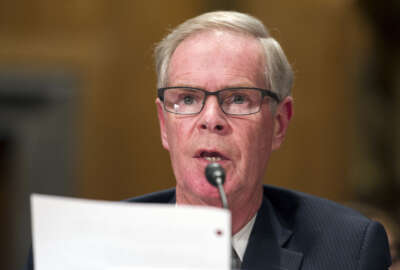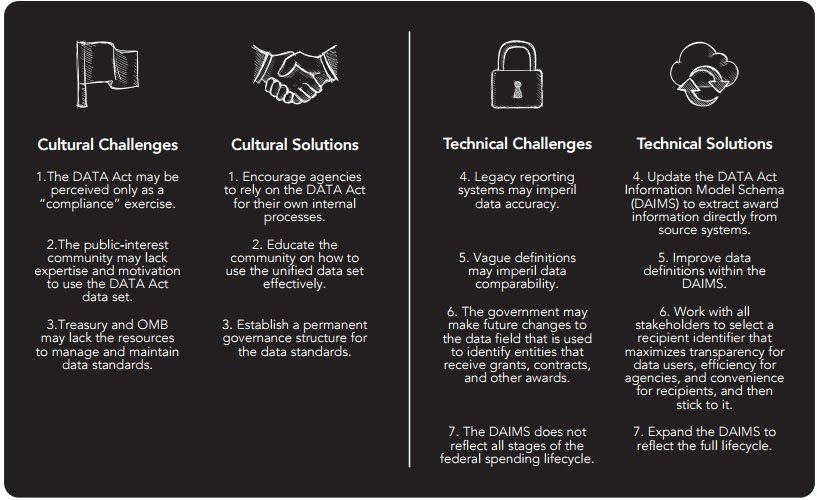

In part one of Federal News Radio's special report on the DATA Act, Treasury Department and Office of Management and Budget officials say the three-year...
In Federal News Radio’s special report, Reporter Meredith Somers looks at the promises and realities agencies encountered in rolling out the DATA Act.
A compliance exercise, a management mandate, a bureaucratic “boondoggle.”
When the Small Business Administration got the memo to start adoption of the Digital Accountability and Transparency Act, Chief Financial Officer and Associate Administrator for Performance Management Tim Gribben didn’t have emuch faith in the law.
“I said in the very beginning, I thought it was a boondoggle. I thought it was a compliance exercise, and we were being sold the bill of goods and yet we had no choice but to do it. That is what I believed,” said Gribben during the Association of Government Accountants’ 2017 CFO-CIO Summit in Washington. “But through my experience of working through the pilot and then through submission, I would say that I don’t feel that way at all anymore. I definitely see the benefits to the DATA Act. Congress forced agencies to go down this route. It’s been painful and there’s still a long way to go. I do worry about the Freedom of Information Act (FOIA) [requests] we’re going to be getting, I worry about the next thing that Congress is going to say that they want us to get to, but with all that said, it’s definitely not a boondoggle in my opinion.”
That should be good news for the teams of financial reporting experts at the Treasury Department and the Office of Management and Budget, who spent three years preparing for the May 9 implementation deadline of the DATA Act.
In part one of a special report looking at the implementation and impact of the DATA Act, Christina Ho, Treasury’s deputy assistant secretary for accounting policy and financial transparency, said during an exclusive interview with Federal News Radio that she credited her small team, and agency’s engagement, to the success of the rollout.
“For three years, by faith I kept telling people that this is a worthwhile endeavor and there will be value out of it,” Ho said. “In fact, that was a very important principle that we took to implement this. We want to implement this law in a way that will help realize the value.”
Treasury on May 9 rolled out the beta version of USASpending.gov. The site is in the prototype phase and in September, Treasury will move it to the current USASpending website. In the meantime, agencies already added spending data to the site.
Ho and other DATA Act advocates have made it clear that May 9 is both a milestone and springboard for federal spending report — especially as agencies’ data have been pouring in and everyone is encouraged to dip their toe in the data pool.
“What’s most significant about [May 9], is for the first time people will be able to track the spending from appropriation all the way down to the individual award level that tells you where that money goes to and what it went into for,” Ho said.

The initial data loaded into the new site is from the second quarter of fiscal 2017, and future data will be reported on a quarterly basis. A few mouse clicks will bring you down to individual contracts for a state and department of your choosing. Look through loans, and set limits on the direct payments to narrow your search.
“All CFO agencies have submitted data at this point already because our reporting deadline was April 30, and we also have a substantial number of small agencies, so we are ready to publish a very high-value data set, with complete information, substantially complete information. There will be some gaps, depending on the agency system implementation maturity, because there are some linkages that are a little bit difficult to implement, so there will be some gaps for a few large agencies,” Ho said.
Despite the gaps in some of the data, Ho said the agile approach her team took to implement the DATA Act helped make it one of the smoothest implementations of her career.
Instead of thrusting a bunch of requirements on agencies years ago, then spending a year to build a system, another year to test it, then realizing everyone had to go back to square one, Treasury took a two-week incremental approach.
“Because we took the agile approach, which required us to engage with the agency, work together, every two weeks, so every two weeks they had the opportunity to test, we built something, they test it, then we adjust based on the feedback,” Ho said. “So there were really no surprises for the agencies in terms of submission, because by the time they were submitting they’ve already done a lot of testing, and also we have been very responsive if there were changes they needed to make and they gave us feedback and we felt that was really good feedback, they get that updated in a matter of weeks. Which I would say that very few government entities can say they have that kind of response rate, for any type of IT changes.”
David Mader, a former OMB controller and now chief strategy officer for Deloitte’s civilian sector, told Federal News Radio in an interview that the teams behind the implementation should be proud of what they accomplished.
“I think the working relationship that developed between Treasury and OMB … and having that sort of single focus saying we are going to accomplish this, and the Hill through appropriations giving some agencies some resources to get it done was helpful,” Mader said. “I think it was a good example of when you get a team together, if they agree on the objective, then you are really going to sort of double down and work through the problems, and we did that; they all did that.”
Mader took over the controller role in June 2014, a month before President Barack Obama signed the DATA Act into law. He is the lead author of a new report titled Data Act 2022: Changing Technology, Changing Culture, which looks at the next five years and what it will take to reach full completion of the DATA Act implementation. That includes seven cultural and technical challenges that need to be addressed.

“I think the report does a good job of documenting some of the challenges that OMB and Treasury faced in getting started, to begin with,” Mader said. “One of the challenges that I appreciated coming into OMB is just how challenging it is actually to unify the 24 CFO Act agencies and get them to basically agree to move in a certain direction.”
Mader said there was a lot of skepticism within the administration, Congress, and the Government Accountability Office, as to whether or not the implementation could happen.
The 2011 version of the act didn’t get far in the Senate, and Danny Werfel, who held the controller position before Mader, was the main administration voice expressing opposition against the initial DATA Act.
While there might be some data quality issues, at least agencies know what their problems are and can go fix them, Mader said.
Mike Peckham, director of the DATA Act program management office at the Department of Health and Human Services, said during a panel during the May 5 Association of Government Accountants and AFFIRM’s CFO-CIO summit that less than 1 percent of HHS’ data submitted through Treasury’s broker system had issues.
“We’re very happy to get the majority of our information through, a small little fraction of a percent didn’t make it through,” Peckham said. “The good thing is we know why it didn’t and we know how to explain that. So as we move forward, we need to focus on that 0.3 percent that didn’t make it in. It’s great to look at your success, it’s wonderful to say that we were able to do this and we were able to make it through, but let’s face it, 0.3 percent of $333 billion is still a good chunk of money and we want to make sure that we get as close to perfect as we can.”
While SBA’s Gribben said the DATA Act requirements might have at first seemed like a boondoggle, his office quickly learned that applying a quality assurance check during the implementation helped catch things that were going unnoticed during submissions to USASpending.gov.
“The DATA Act forced us to look at what we were doing,” Gribben said. “The way we had done it before, the program offices who had the management information systems that submitted that data to USASpending, there was no one really doing that quality assurance check over it. As part of the DATA Act process, we took over that process of submitting the data to USASpending and doing the reconciliation between what we’d had in our financial system, and what we found was that there were some records that we thought were being sent all along that were not being sent. And we discovered that because of the error messages that we were getting from the broker.”
SBA was one of Treasury’s pilots on the data broker solution, Gribben said, so the agency had a bit of a leg up when it came to preparing for data submission. By the time other agencies were preparing for the April 30 deadline, SBA had already been submitting data for six months.
“So when we submitted on Friday [April 28], there were only 24 records that we were not able to submit, and we know exactly why they couldn’t submit and a lot of them have to do with prior year obligations,” Gribben said.
But not every agency has had as smooth a transition to DATA Act requirements.
Tyson Whitney, director of the Agriculture Department’s transparency accountability and reporting division, said USDA was one of three agencies that submitted a partial submission for the implementation; however, the agency has already submitted an updated data set since the April 30 deadline.
“We’ve had significant challenges in getting to where we are today and we have the long road ahead of us, but we’re still very proud of what we’ve been able to achieve,” Whitney said, adding that 26 of USDA’s components are reporting for the DATA Act. “This has been a tremendous learning experience for us. We’ve watched throughout this process a greater communication between the communities that were traditionally siloed; the budget staff is working much more closely with finance staff as well as with the program staff and the procurement staff.”
So what’s in it for you? Whether you’re a curious member of the public, an academic, media member, lawmaker or agency manager, there’s something in the data for everyone.
Peckham said he hoped that the new standard of reporting will open new doors on Department of Health and Human Services grants.
The DATA Act required a two-part pilot that covers federal grants and contracts.
HHS handled the grant side, while OMB is handling the contracts portion.
According to the Deloitte report, while the grants side of the pilot is on schedule, OMB’s portion “is nearly a year behind schedule and may derail the entire timeline for Section 5.”
Mader said he did not know the current status of OMB’s pilot. The Office of Federal Procurement Policy (OFPP) is leading the procurement side with the help of GSA’s 18F.
According to an April 2016 Government Accountability Office report, OMB worked with HHS and GSA to redesign parts of the pilots.
A December 2016 GAO report said OFPP and 18F were to develop and test a proof of concept reporting portal for reports required by the Federal Acquisition Regulations. GAO says OFPP and 18F are piloting it with the centralized reporting of certified payroll by contractors working construction projects.
But auditors also say the procurement plan “does not clearly describe and document how findings related to centralized certified payroll reporting will be more broadly applicable to the many other types of required procurement reporting.”
Because payroll data includes personally identifiable information (PII), OMB made a decision to strengthen the cybersecurity of the pilot to protect it and therefore delay the launch until early 2017.
Mader testified during a December hearing before the House Subcommittee on Government Operations that when the tool was being developed, “we identified some concerns around the robustness of the cybersecurity aspect of that system and we’ve had to actually restart that process.”
Whitney said USDA will hopefully understand a bit more about its budget process, and will also benefit from the connection between its “general ledger” and its own grants and loans.
“We can now crosswalk information we couldn’t do before, or took months of manual data calls asking people to submit reports individually, collate them and put them together,” Whitney said. “Now we can individually assess that information and I believe that is a tremendous boon for us.”
Copyright © 2024 Federal News Network. All rights reserved. This website is not intended for users located within the European Economic Area.



